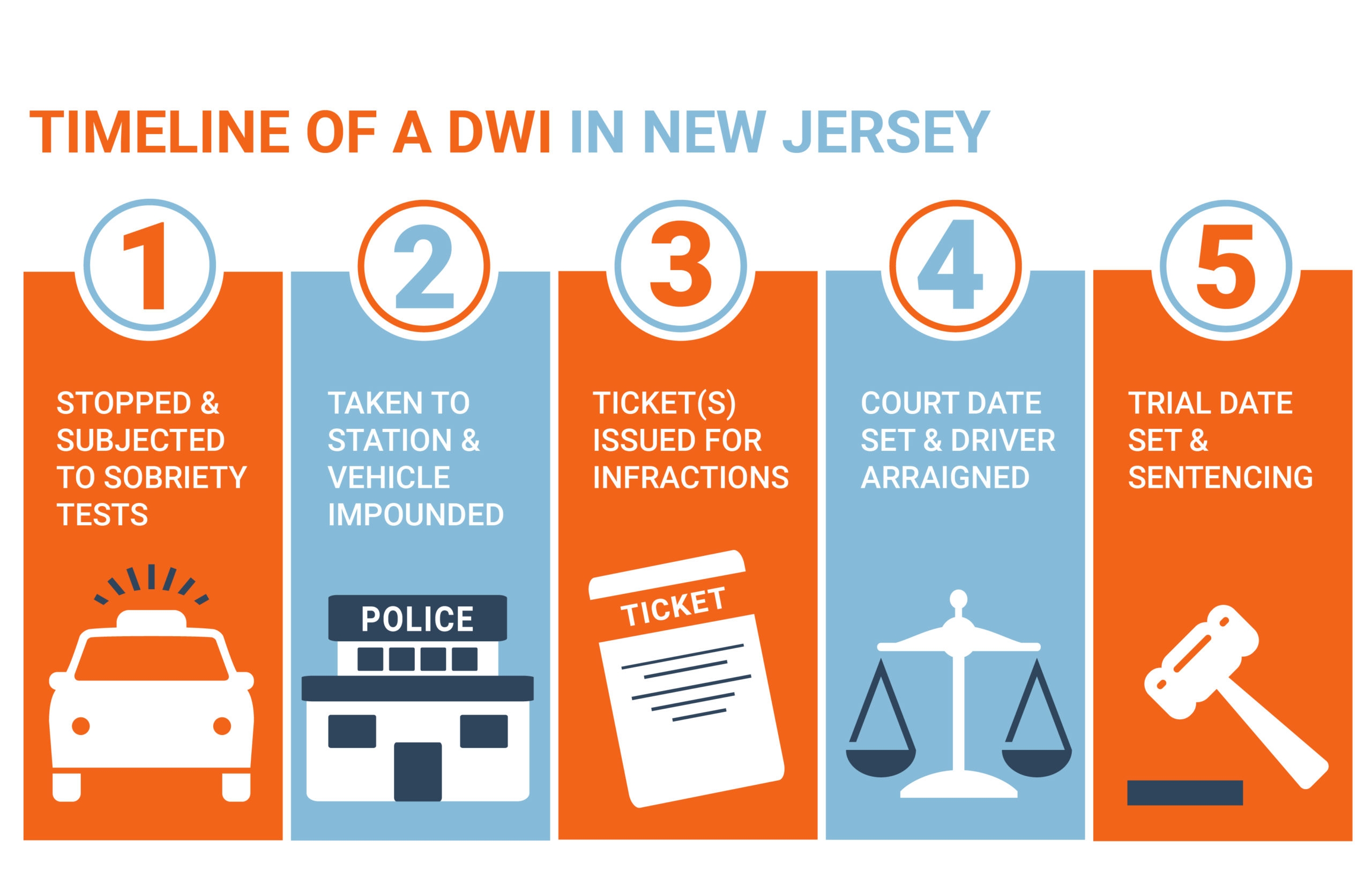Being charged with driving under the influence of drugs or alcohol (DUI) is a serious offense in New Jersey. Drivers who are charged with DUI for the first time may be understandably frightened and unsure of what to do. The following guide is designed to help those looking to understand what to expect and how to avoid the worst possible consequences.

What Happens At the Scene
A person may be pulled over by police under suspicion of driving drunk or for an unrelated traffic offense. In other cases, a driver may be asked to pull off to the side at a DUI checkpoint. Regardless of what aroused the officer’s suspicion, the driver can expect to be tested for possible intoxication. This can include physical sobriety tests (e.g. walking in a straight line or following a finger with one’s eyes) and/or a portable breath-testing device. Should the driver be deemed to be intoxicated, he/she will be arrested and brought to the police station.
What Happens At the Police Station
At the police station, the driver will be asked to undergo another test, this time by submitting a stationary version of the breath tester. In New Jersey, this is typically the Draeger Alcotest® breath analyzing system. In rare cases, the police may ask for a urine or blood sample. Note that failure to submit to the Alcotest blood alcohol (BAC) test will result in license revocation (see below) unless that refusal is successfully challenged in court.
Since NJ does not classify DUI as a criminal offense (it is a traffic violation), the driver will not normally be held overnight or be required to make bail unless there is a related criminal offense (like drug possession), serious personal injury, or significant property damage. However, police will often tow the driver’s vehicle and keep it impounded for 12 hours. When the 12-hour period is up, the driver can go to retrieve his vehicle or send someone else to get it for him/her.

What Happens After Getting Arrested for DUI in NJ
Several things will happen after a person is arrested for DUI in New Jersey.
Ticket(s) will be issued. First, the person is going to be released from the police station and given one or more traffic tickets. The officer can issue a ticket for the DUI and any other traffic infractions he/she observed (e.g. speeding or red light ticket) or deemed warranted in this case (e.g. reckless driving or careless driving, depending on the circumstances).
Court date will be set. The driver will also be assigned a court date. This is the date the driver will be arraigned on the charges (see below). The court date will be written on the bottom of the DUI ticket and usually happens within a few days of the arrest. This is the ideal time to hire an attorney, as he/she can advise the driver on how to plea and other strategies that might make sense prior to arraignment.

Driver will be arraigned. At the arraignment, the judge will lay out the full set of charges, explain the driver’s rights under the law, and request a plea of either guilty or not guilty. If the driver pleads guilty, he/she may be sentenced right then and there. If not, the judge will postpone and set a date for trial. At this point, a person can also apply for representation by a public defender if he/she has not already hired a private attorney and income qualifies.
A person would be well advised to hire an attorney. Many critical mistakes in a first-time DUI case are made during the arrest. The sooner an attorney can step in the more likely a case will have a positive outcome.
Fines and Penalties for a First-Time DUI in NJ
The punishment for a first offense of DUI in NJ depends on the BAC (blood-alcohol content) of the driver at the time of the arrest.
1st Offense DUI 0.08% to 0.09%:
- Jail time: A driver can be sentenced to up to 30 days in jail.
- IDRC: A judge can also order a person to spend between 12 and 48 hours in an Intoxicated Driver Resource Center. The driver may also have to pay an IDRC fee of $230.
- Fine: A civil fine of $250 to $400 can also be imposed.
- Surcharge: Upon conviction, the driver can be required to pay a state surcharge of $1,000 per year for 3 years.
- Ignition interlock device. Drivers will be required to install an IID for three months.
- Other fees: Drivers can also face additional fees associated with a DWI conviction, including contributions to the Safe Neighborhood Services Fund (SNSF; $75), Drunk Driving Enforcement Fund (DDEF; $100), and the Alcohol Education and Rehabilitation Fund (AERF; $100).
1st Offense DUI 0.10% and Greater
- Jail time: 30 days.
- IDRC: The driver can be required to spend between 12 and 48 hours in an Intoxicated Driver Resource Center and pay an IDRC fee of $230.
- License suspension: With a BAC of 0.15% or greater, a person’s license can be suspended for 4 to 6 months.
- Fine: The fine goes up to between $300 and $500 with the higher BAC.
- Surcharge: A state surcharge of $1,000 per year for 3 years applies at this level as well.
- Ignition interlock device: Drivers with a BAC of 0.10% to 0.14% will be required to install one for the duration of the suspension plus an additional 6 to 12 months, or 12 to 18 months for a BAC of 0.15% of greater.
- Other fees: The driver may also be required to make contributions to SNSF ($75), DDEF ($100), and AERF ($100).
Altogether, the total cost of a first-offense DUI conviction can range from $3,755 to $4,005. This does not include any other economic impact, such as the loss of a job, or additional costs such as those associated with having one’s car impounded, the suspension reinstatement fee, or the expense of finding alternate transportation during the suspension period. Keep in mind that a DUI remains on one’s driving record forever, which means one may never escape the shadow of a first-time DUI conviction.
First Offense of Refusing a Breath Test
New Jersey’s implied consent laws means a driver who chooses to drive on a public roadway has surrendered any right to refuse a sobriety test. Those who unlawfully refuses a breathalyzer/Alcotest can face consequences even if he/she is acquitted of (or never charged with) DUI. This includes a license revocation between 7 months and 1 year, plus $300 to $500 in fines. The license revocation will run concurrently with any suspension/revocation resulting from a DUI conviction. A judge is also permitted to demand the installation of an ignition interlock device as part of the sentence for a breath test refusal. A conviction for a breath test refusal can also raise insurance rates, even if the driver beats the DUI charge. Read more here
First Offense of Underage DUI
Drivers under the age of 21 are not permitted to consume alcohol at all. As such, New Jersey will punish underage drivers found with even so much as 0.01% BAC. Those whose BAC is between 0.01% and 0.10% can have their license suspended for 30 to 90 days. He/she can also be required to perform up to 30 days of community service and either attend an IDRC or other alcohol education program. A driver whose BAC is above 0.10% can also face the full penalties of an adult DUI.
These penalties are in addition to those which may apply for purchasing, consuming or possessing alcohol by a person under the age of 21, should police charge the driver with those offenses as well.
DUI Sentencing Alternatives
The punishment for a first-time DUI offender in NJ can be harsh. Jail time is often the most difficult penalty to endure. In some circumstances, however, an attorney can argue that the client should receive an alternative to jail time. Such options are usually offered to those who may need to seek help for alcohol or drug addiction which cannot be obtained while in jail. It may also be offered to prevent financial hardship as a result of not being able to work while locked up. Possible jail alternatives can include one or more of the following:
- Community service. Sheriff’s Labor Assistance Program (SLAP) allows a person to perform monitored community service and partake in labor projects.
- House arrest. The person will be confined to the home while being monitored by an electronic ankle device.
- Probation. The person will have to make regular check-ins with a probation officer and may be limited in his/her travels.
- IDRC. While one or two days at an IDRC is often ordered by a judge, a person can sometimes reduce their prison sentence in exchange for a longer stay if the person is struggling with substance abuse.
Effect of First-Offense DUI on Auto Insurance in NJ
In addition to having an impact on one’s job security, driving privileges, and freedom, a first-time DUI conviction can also make it difficult to obtain affordable auto insurance. Studies have found that, after a single DUI conviction, insurance premiums in New Jersey can rise between 72% and 132%. The exact increase will depend on a number of factors, including age, driving history, income level, the neighborhood one lives in, and more.
In some cases, an insurer may decline to cover the individual, forcing him/her to turn to special high-risk insurance carriers, whose premiums are much more expensive and whose coverage is much smaller. Either way, a person convicted of a DUI in New Jersey can expect to pay substantially more each year for auto insurance.
Out-of-State Drivers with A DUI in NJ
A person licensed to drive in a state other than New Jersey who is charged with DUI within NJ state limits faces the same consequences as a person whose license was issued in NJ. This includes fines, jail time, and other fees. While the MVC cannot suspend a license from another state, it can suspend the driver’s privilege to drive in NJ. An out-of-state driver will have to challenge the charges in the NJ court system, which may require multiple return trips.
It should be noted that New Jersey participates in the Driver’s License Compact, an interstate agreement among most of the U.S. states to share information about drivers who commit traffic offenses in their respective jurisdictions. As such, the NJ MVC is likely to share details of a DUI conviction with the licensing authority of the driver’s home state. How the home state will respond varies; some may choose to suspend the license of the driver entirely, while others may also impose other penalties as though the DUI had happened at home.
A person from another state who is charged with DUI in New Jersey will need the help of an attorney licensed to practice law there.
Should You Use a Public Defender for a First DUI Offense?
Many of New Jersey’s public defenders are excellent attorneys who work hard to get the best results for their clients. However, public defenders often have overwhelming caseloads that make it difficult to provide each client with the time and attention his/her case deserves. In addition, it is a misconception that a public defender is free; the defendant is expected to pay a fee at the conclusion of the case. By contrast, a private attorney can give each client full and undivided attention, and dedicate substantially greater resources to the defense of the charges.
Although a public defender may seem like a more cost-effective option, the cost of a conviction—from the fees, fines, insurance increase, employment challenges, and other economic impacts—can often tilt the scales the other way. Moreover, it is important to remember that a DUI conviction in New Jersey remains on one’s driving record for the rest of one’s life.
Data on DUI in New Jersey
In the past decade, DUI charges have fallen 20% in NJ. The fiscal Year 2009 (Oct. 1, 2008 – Sept. 30, 2009) saw police issue 37,597 charges for impaired driving. By FY 2018, that number declined to 29,942. Police in Monmouth County arrested more intoxicated drivers (2,720) than any other county in NJ. It is followed by Middlesex, Camden, and Bergen counties.
Frequently Asked Questions About First-time DUI in NJ
Although jail time is common for first-offense DUIs in NJ, it is not mandatory. An attorney can argue for a lenient sentence that includes jail alternatives (e.g. community service and/or IDRC) based on the circumstances of the case and the driver’s history.
A driver can lose their license for up to 1 year upon conviction for a first DUI offense in New Jersey.
It may be possible to have a DUI charge dismissed if the circumstances of the traffic stop, arrest, or gathering of evidence is deemed unconstitutional. In addition, some NJ judges are throwing out DUI charges due to unreliable Alcotest results.
DUI, like all traffic offenses in NJ, remains on the person’s driving record permanently.
Insurance companies regularly request updated driving records of their clients from the NJ MVC. As such, any DUI conviction will appear when the insurance company gets its most recent copy of one’s driving record.
TSA’s stance on DUI is unclear. DUI is not listed as a disqualifying offense. However, a first-offense of DUI will be taken into account along with any other information gathered from the background check to determine if the person is a security risk. Therefore, a DUI may be a contributing factor in having one’s application rejected but is unlikely to be the only reason.
A person unauthorized to remain in the U.S. who is arrested for DUI can be deported if his/her legal status is discovered. An immigrant who has a valid visa or green card can still have his/her legal status revoked if the DUI results in criminal charges (e.g. assault by automobile or fleeing the scene of an accident).
A person with a DUI conviction can still apply for a commercial license provided the suspension period has passed and the license has been reinstated. However, a passenger (P) endorsement will be denied for the first 3 years.
Who Should I Contact?
If you or someone you love has been convicted of first-offense DUI in New Jersey, it is urgent that you retain legal counsel. The lawyers at Rosenblum Law are skilled criminal defense and traffic ticket attorneys with experience helping people facing DUI and other serious traffic and criminal charges. Email Rosenblum Law or call 888-815-3694 today for a free consultation about your case.





 888-815-3649
888-815-3649

